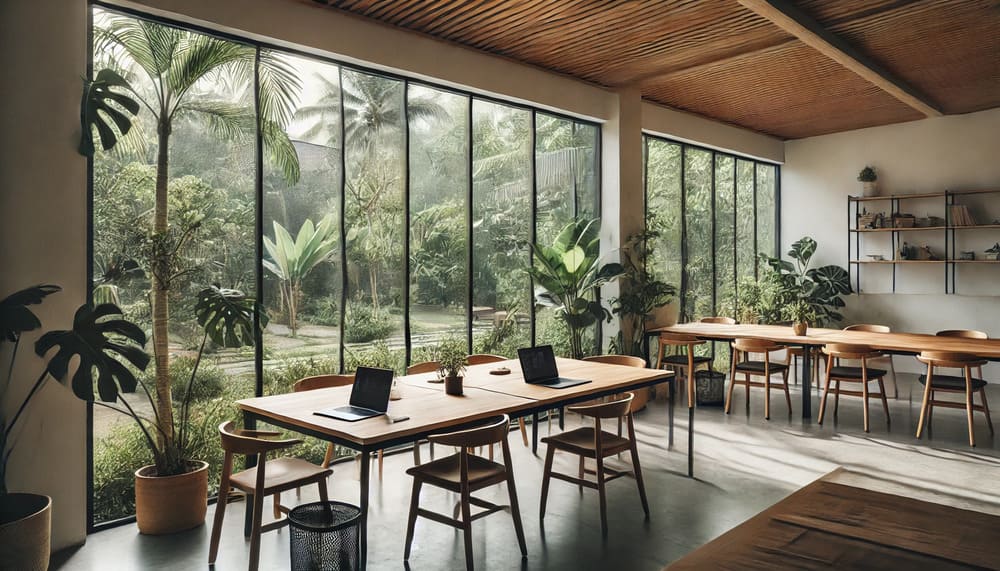Bali kini menjadi salah satu tujuan favorit para digital nomad dari seluruh dunia. Dengan pemandangan yang indah, biaya hidup yang terjangkau, dan budaya yang ramah, Bali menjadi tempat yang menarik bagi para freelancer dan pekerja jarak jauh. Kalau kamu sedang berpikir untuk menjadikan Bali sebagai basismu, ada beberapa langkah penting yang perlu kamu ambil agar transisi ke gaya hidup ini berjalan lancar.
Persyaratan Visa untuk Digital Nomad
Salah satu hal pertama yang perlu kamu pertimbangkan ketika bekerja di Bali sebagai freelancer adalah visa. Meskipun Indonesia belum punya "visa digital nomad" khusus, ada beberapa opsi visa yang cocok buat kamu.
Opsi yang paling sering dipakai adalah Visa Sosial Budaya (B-211), yang memungkinkan kamu tinggal di Indonesia selama 60 hari. Visa ini bisa diperpanjang beberapa kali hingga maksimal enam bulan. Banyak digital nomad yang memilih visa ini karena tidak membutuhkan pekerjaan lokal, tapi tetap memungkinkan untuk bekerja jarak jauh. Opsi lain adalah Visa Bisnis, yang memberikan masa tinggal hingga 60 hari, biasanya dipakai bagi yang sedang menjajaki peluang bisnis. Kalau mau tinggal lebih lama, kamu bisa mempertimbangkan KITAS (Izin Tinggal Sementara), meskipun ini lebih kompleks dan memerlukan sponsor dari perusahaan lokal.
Disarankan untuk bekerja sama dengan agen visa di Bali agar mereka bisa membantu kamu memilih visa terbaik sesuai kebutuhan.
Mencari Akomodasi di Bali
Bali menawarkan banyak pilihan akomodasi, baik untuk tinggal jangka pendek maupun panjang. Kamu bisa menemukan semuanya, mulai dari sewa jangka pendek di Airbnb hingga sewa jangka panjang berupa vila, guesthouse, dan apartemen. Harga bisa bervariasi tergantung lokasinya, tapi secara umum, Bali menawarkan biaya hidup yang lebih terjangkau dibandingkan negara-negara Barat.
Saat memilih tempat tinggal, penting untuk prioritaskan akses internet yang stabil dan ruang kerja yang nyaman. Area populer seperti Canggu, Seminyak, dan Ubud terkenal dengan infrastruktur yang baik, cocok untuk digital nomad. Pastikan untuk mengecek kecepatan internet dan fasilitas sebelum kamu menyewa, karena kualitas internet bisa berbeda-beda di setiap lokasi.
Menyiapkan Ruang Kerja
Ruang kerja yang produktif itu penting banget kalau kamu tinggal sebagai digital nomad. Bali punya banyak coworking space yang dirancang khusus untuk pekerja jarak jauh. Beberapa tempat yang populer seperti Dojo Bali di Canggu dan Outpost di Ubud menawarkan internet cepat, ruang kerja yang nyaman, serta kesempatan untuk bertemu freelancer dan entrepreneur lainnya.
Kalau kamu lebih suka bekerja dari rumah, pastikan akomodasimu punya koneksi internet yang bagus dan siapkan ruang kerja yang bisa membantu produktivitas. Internet di Bali bisa sedikit tidak konsisten di beberapa area, jadi penting untuk tes koneksi sebelum kamu menetap.
Biaya Hidup di Bali
Salah satu daya tarik utama Bali untuk digital nomad adalah biaya hidup yang terjangkau. Meski pengeluaran tergantung pada gaya hidup, rata-rata anggaran bulanan digital nomad di Bali berkisar antara 1.000 hingga 2.000 USD. Anggaran ini sudah bisa menutupi biaya sewa, makan, transportasi, dan kegiatan rekreasi.
Biaya sewa bisa bervariasi tergantung jenis akomodasi dan lokasinya. Sewa jangka pendek biasanya lebih mahal, tapi opsi jangka panjang seperti guesthouse atau apartemen bisa menawarkan harga yang lebih baik. Untuk makanan, jika kamu memilih makan di warung lokal, harganya sangat terjangkau, sekitar Rp30.000 per porsi. Restoran ala Barat memang lebih mahal, tapi masih relatif terjangkau dibandingkan negara-negara Barat.
Untuk transportasi, kebanyakan digital nomad di Bali memilih menyewa motor. Biaya sewa motor per bulan berkisar antara Rp700.000 hingga Rp1.000.000. Selain itu, kamu juga bisa menggunakan aplikasi transportasi online seperti Gojek untuk kemudahan.
Terhubung dengan Komunitas Digital Nomad
Bali punya komunitas digital nomad yang aktif banget. Membangun koneksi itu penting, baik untuk perkembangan pribadi maupun profesional sebagai freelancer di Bali. Coworking space sering mengadakan acara dan workshop di mana kamu bisa bertemu orang-orang yang berpikiran sama, berbagi ide, atau bahkan bekerja sama dalam proyek.
Media sosial juga bisa menjadi cara bagus untuk terhubung dengan komunitas. Grup Facebook seperti Bali Digital Nomads menyediakan banyak saran dan informasi soal tinggal dan bekerja di Bali, serta tempat untuk berbagi pengalaman.
Menjaga Kesehatan dan Keamanan
Kesehatan dan kesejahteraanmu sangat penting ketika tinggal di luar negeri. Untungnya, Bali menawarkan layanan kesehatan yang bagus untuk ekspatriat. Di Denpasar dan Ubud ada rumah sakit internasional yang melayani orang asing, serta klinik-klinik yang tersebar di seluruh pulau.
Sebaiknya kamu punya asuransi kesehatan internasional yang mencakup biaya perawatan medis di Indonesia. Selain layanan kesehatan konvensional, Bali juga dikenal sebagai pusat wellness dengan banyak studio yoga, retreat kesehatan, dan pusat kebugaran. Kamu bisa memilih untuk yoga di Ubud atau berselancar di pantai Canggu untuk tetap fit selama bekerja jarak jauh.
Mengatur Keuangan dan Pajak
Sebagai digital nomad, mengatur keuangan saat bekerja dari jarak jauh di Bali itu penting. Sebagian digital nomad membuka rekening bank lokal, tapi banyak juga yang tetap menggunakan layanan perbankan internasional seperti Wise atau Revolut karena lebih praktis. Mengatur transaksi sehari-hari, membayar sewa, dan mengelola komitmen finansial lainnya cukup mudah di Bali.
Soal pajak, ini bisa agak rumit. Tergantung negara asalmu, kamu mungkin masih harus melaporkan pajak di negara asal dan di Indonesia. Untuk menghindari masalah hukum, disarankan untuk berkonsultasi dengan profesional pajak yang ahli dalam perpajakan internasional atau pekerja jarak jauh.
Bali memberikan peluang luar biasa bagi freelancer dan digital nomad untuk tinggal dan bekerja di lingkungan yang menginspirasi. Dengan mengurus aspek penting seperti visa, akomodasi, ruang kerja, dan koneksi komunitas, kamu akan siap untuk sukses sebagai digital nomad. Biaya hidup yang terjangkau, pemandangan yang indah, dan komunitas nomad yang mendukung membuat Bali jadi destinasi ideal bagi para pekerja jarak jauh yang ingin mencari keseimbangan antara kerja dan liburan.
Pastikan kamu punya visa yang tepat, ruang kerja yang andal, dan gaya hidup sehat untuk memaksimalkan pengalamanmu. Bali punya banyak hal untuk ditawarkan, mulai dari pantainya yang indah hingga coworking space-nya, menjadikannya tempat sempurna bagi digital nomad untuk mengejar tujuan profesional dan pribadi.







